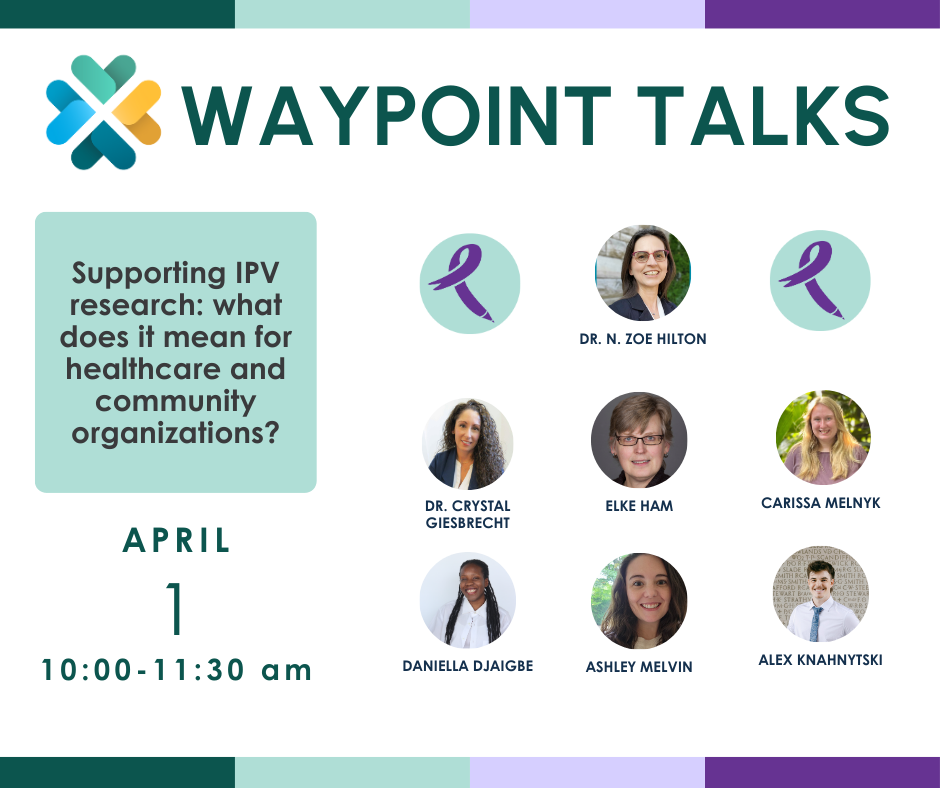
Upcoming Events
Photo by @glencarrie

Risky Business of Assessing Intimate Partner Violence Risk: Research to Practice
Join us for an exclusive networking event where scholars, researchers, police organizations, and other professionals come together to enhance knowledge and practices related to the assessment of intimate partner violence.
This networking event will be held on June 11, 2025, between 9:00 am and 4:00 pm in St. John’s, NL
Stay tuned for more information. Request a spot here: https://form.jotform.com/elkeh/risky-business-IPV-risk-assessment


AHE Forensic Grand Rounds
Police and Researcher Use of the ODARA: Interrater Agreement, Comparison with Published Norms, and New Percentile Norms for Canada
Presentation by Dr. N. Zoe Hilton, Ph.D., C.Psych., University of Toronto and Waypoint Centre for Mental Health Care
Click here to register: Meeting Registration - Zoom

Waypoint Talks: Supporting IPV research
Join us for this Waypoint Talk Series presentation about the implications, responsibilities, and opportunities that come with supporting IPV research. This vital discussion will explore how research can shape better care delivery, improve community support, and drive meaningful change. Register now!

5th Annual Canadian Forensic Psychology Virtual Conference
See Danika Widmer’s presentation: Examining Police Officers Utilization of the Ontario Domestic Assault Risk Assessment: Assessing Risk Mitigation Strategies to Reduce Intimate Partner Violence at the 5th Annual Canadian Forensic Psychology Virtual Conference.

Waypoint Talks Fall Series: Assessing and addressing the hidden crime of stalking - Implications for coercive control
Join us for a discussion exploring what stalking is, why it matters, and a tool that has been developed to help those being stalked.
Speaker: Dr. TK Logan
TK Logan, Ph.D. professor at the University of Kentucky, Department of Behavioral Science. Her research focuses on gender-based violence, including coercive control, sexual assault and stalking, firearm-related risks, personal safety planning, effectiveness of protective orders, and substance abuse disorder treatment program outcomes. Dr. Logan is an author of over 200 research articles and book chapters and serves on the editorial board of four journals. Dr. Logan’s books include Women and Victimization: Contributing Factors, Interventions, and Implications (American Psychological Association Press) and Partner Stalking: How Women Respond, Cope, and Survive (Springer Publisher). Dr. Logan is also involved with several community boards and national organizations working to prevent gender-based violence.

Waypoint Talks Fall Series: Improving prediction of intimate partner violence by identifying coercive controlling behaviours in police reports
Improving prediction of intimate partner violence by identifying coercive controlling behaviours in police reports
Join us in learning about research in New Zealand exploring revictimization and the predictive ability of controlling behaviours.
Speaker: Dr. Apriel Joliffe Simpson
Dr. Apriel D. Jolliffe Simpson is a Lecturer at Te Puna Haumaru New Zealand Institute for Security of Crime Science (NZISCS), University of Waikato. Dr. Jolliffe Simpson conducts research on family and whānau (extended family) violence, including decision-making, coercive control, risk assessment, and case management by family violence practitioners. She is one of the few researchers internationally to have researched the relationship between controlling behaviour and intimate partner violence revictimization, as well as studying risk assessments by police officers and family violence practitioners. Dr. Jolliffe Simpson is an emerging scholar, having received her PhD. From the University of Waikato, New Zealand, in 2022.

Waypoint Talks Fall Series: Responding to coercive control in the UK - What have we learned?
Join us to learn how the criminalization of coercive control in the UK has impacted policy, practice, and service delivery.
Speaker: Dr. Amanda Robinson
Professor Amanda Robinson is Professor of Criminology at Cardiff University, UK; Co-Director of the Security, Crime and Intelligence Innovation Institute; and Director, Universities' Police Science Institute. She was directly involved in shaping the Welsh Government's White Paper proposals that led to the Violence against Women, Domestic Abuse and Sexual Violence (Wales) Act 2015. Dr. Robinson’s research includes a strong policy focus, aiming to advance knowledge in relation to how the police and criminal justice system, health and community-based agencies can best respond to violence against women, domestic abuse and sexual violence. In particular, Dr. Robinson has published on police practitioner understandings of coercive control offences in the UK, on culturally appropriate responses to IPV, and victim experiences of justice.

Improving Approaches to End Intimate Partner Violence
Waypoint Talks - Improving Approaches to End Intimate Partner Violence
Jun 26, 2024 07:00 PM EST
Join us via ZOOM for a conversation with Dr. Nadiya Sunderji, Waypoint’s President and CEO, and Dr. N. Zoe Hilton to learn about her work creating a better approach to ending intimate partner violence.
Intimate Partner Violence on the Front-line: Police Risk Appraisal and Intervention
Canadian Psychological Association Conference, Ottawa, June 21 -23, 2024
Symposium moderated by Dr. Mary Ann Campbell, University of New Brunswick
The actions of front-line police officers when responding to intimate partner violence (IPV) calls should be formed by accurate appraisals of violence risk to the victim(s) of these incidents. The current symposium describes a program of research focused on police IPV responding. The first paper will discuss qualitative findings with patrol officers about their experiences of using the Ontario Domestic Assault Risk Assessment (ODARA) for IPW risk appraisal in the field, providing insights into barriers for using this tool in practice. The next paper examines police records to describe how patrol officers respond to IPV calls for service in terms of the legal and non-legal options available to them and the degree to which these responses relate to IPV risk assessed by the officer using the ODARA. The symposium will conclude with a discussion of an alternative method of risk appraisal for police that considers criminogenic-based personality features of suspects as characterized in police records and introduces a new tool for risk appraisal for use by police that may also guide associated interveners in targets for change. Overall, the content of this symposium is relevant to training and policy makers working with police on best practices.
https://convention.cpa.ca/scientific-program/program-schedule-and-themes/
A Culturally Responsive Approach to IPV Risk Assessment - A Panel Discussion
Canadian Psychological Association Conference, Ottawa, June 21 -23, 2024
Join us for the panel discussion: A Culturally Responsive Approach to IPV Risk Assessment, Moderator: Angela Eke, June 21, 2024, 10:00 - 10:55 am, CPA Criminal Justice Section
https://convention.cpa.ca/scientific-program/program-schedule-and-themes/
Intimate Partner Violence Knowledge Exchange
Please join us for a knowledge exchange where professionals come together to share insights and enhance our response to IPV survivors.
Presented by Dr. Angela Eke, Charmaine Nolan, Dr. Natalie Snow and Dr. Zoe Hilton

Intimate Partner Violence: Identifying and Monitoring Coercive Controlling Behaviors
Free Webinar recorded on February 1, 2023, free to view anytime.
Intimate partner violence is already a complicated form of interpersonal violence. Problems range from the cycle of abuse to the confusing loyalty exhibited by abused partners. These problems are further complicated by the fact that controlling behaviors of the perpetrating partner often go undetected by others and may be normalized by the abused partner.
What we know is that coercive control is more common in abusive partner relationships than realized. Coercive control is often characterized by the perpetrator’s intention to gain control; the victim not wanting to be controlled; and the presence of threats or implied threats that lace the interactions in the abusive relationship. Because these behaviors often go undetected, this presentation provides a concise overview of the behaviors entailed in coercive control, including what evaluators, treatment providers, supervising agents should be monitoring and assessing.
It is critical for professionals to be able to identify coercively controlling behaviors, in order to effectively evaluate, supervise, and treat abusive perpetrators. It will also be of interest to those working with individuals who may have cause to wonder whether their client, friend, or colleague is in an abusive relationship and offer ideas for intervention.

Coercive Control in Intimate Relationships – Recent Research and Practical Implications
The Waypoint Research Institute is excited to present Waypoint Talks:
Coercive Control in Intimate Relationships – Recent Research and Practical Implications
This FREE webinar is designed for clinicians, researchers, partners, and organizations supporting healthcare and the criminal justice sectors interested in intimate partner violence (IPV) and coercive control.
Coercive control includes non-physical but abusive behaviours that control an intimate partner and coerce them to do what the abuser wants. Coercive control is thought to be a risk factor for severe and repeated intimate partner violence. Coercive control has been defined in various ways in research, in assessment tools, and in legislation to criminalize the behaviour.
In this webinar, we will present three studies that explore how to measure coercive control using different sources of information:
1. self-reported IPV in a national US sample of young adults,
2. police reports of IPV in Ontario,
3. an attempt to adapt self-report assessments to measure coercive control from police reports.
We will discuss how researchers can approach coercive control conceptually and methodologically, and the practical implications for assessing coercive control and IPV risk.

N5 5th North American Correctional and Criminal Justice Psychology Conference
Meet the Team at N5!
Our team will be at N5 to share initial research and lessons learned.
“Coercive control in police and self-reports of intimate partner violence”
Friday June 23, 11:00 – 11:55 Sheraton Hall B
Come and hear about the background research to this project and what we are doing to measure and understand coercive, controlling behaviour in intimate relationships.
“A scoping review of the lived experience, measurement, and policing of coercive control in 2SLGBTQQIA+ relationships”
Friday June 23, 14:00 – 15:00 Grand Centre/West Ballroom
Meet and chat with some of our team members about our related work on coercive control at this poster session.
“Developing successful academic-police partnership through the lens of researchers and law enforcement”
Sunday June 25, 14:00 – 14:55 Sheraton Hall B
A lively discussion and exploration of the caveats and challenges academic researchers and police personnel navigate when developing effective, impactful, mutually beneficial, and sustainable research.

